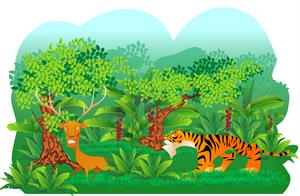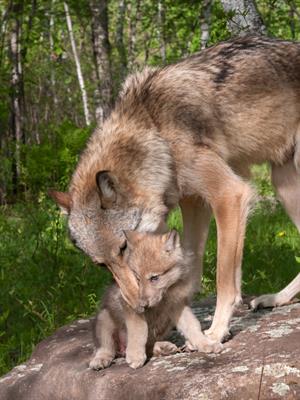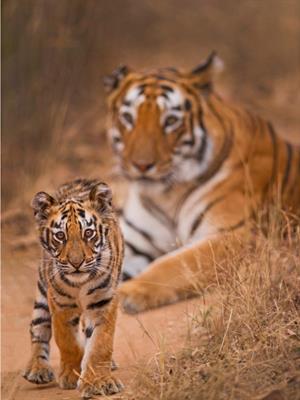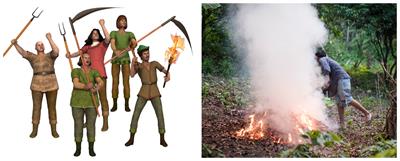PDF chapter test TRY NOW
Narrator: Shere Khan was the tiger who lived near the Waingunga River, twenty miles away.
Father Wolf: (Angrily) He has no right to come here! By the law of the Jungle he has no right to change his quarters without due warning. If he comes here, he will frighten every head of game within ten miles and I – I have to kill for two, these days.
Mother Wolf: (Quietly)His mother did not call him Lungri (the Lame One) for nothing. He has been lame in one foot from his birth. That is why he has only killed cattle. Now the villagers of the Waingunga are angry with him, and he has come here to make our villagers angry. They will scour the jungle for him when he is far away, and we and our children must run when the grass is set on fire. Indeed, we are grateful to Shere Khan!
Tabaqui: (Quietly) I go. You can hear Shere Khan below in the forest.
Explanation:
The narrator gives a brief introduction about Shere Khan. It is said that Shere Khan lived \(20\) miles (or about 30 km) away from the hills. He lived near a river called Waingunga. However, he seems to have shifted his hunting grounds and have come to Seeonee Hills.

Shere Khan lived near Waingunga River
Tabaqui succeeded in his mission as Father Wolf was irritated and furious. He called out angrily, saying that Shere Khan had no right to come there. Also, according to the laws of the jungle, peace has to be maintained between the wolves and the greater animals such as tigers. However, changing the hunting grounds without proper warning would make hunting difficult for the wolves. The tiger will scare the weaker animals away, and the wolves will have to work overtime and harder.

The presence of a tiger will scare the animals away
Moreover, Father Wolf is worried as he had to even hunt for himself and his family. Since Mother Wolf is nursing their four cubs, she cannot help her husband hunt. Hence, he says, "I have to kill for two, these days".

Mother Wolf can't hunt as she has to take care of the cubs
Later, Mother Wolf reveals a piece of important information about Shere Khan. She says how Shere Khan was crippled and had been lame in one foot since his birth. As a result, he received a nickname; his mother (and eventually everyone else) called him Lungri- meaning 'the lame one'- to denote that he was disabled.

Shere Khan's mother called him Lungri as he was lame since birth
Moreover, Shere Khan never bothered to chase or hunt down his prey. He would simply capture, kill, and eat cattle instead. This practice had angered the villagers of the Waingunga. Mother Wolf fears that the people would soon search the forest of Waingunga for the tiger, and they would set the same on fire. Mother Wolf also sounded distressed because Shere Khan would anger the people of Seeonee Hills and that the wolves may end up running for their lives.

The angry villagers may set the forest on fire
Mother Wolf's dislike towards Shere Khan becomes more pronounced when she sarcastically adds that the wolves are thankful to Shere khan and are happy about his presence in the hills.
Soon after that, Tabaqui leaves the premise but tells the wolves quietly that Shere Khan was down the hill, and one may hear his growl from above.
Meaning of difficult words:
S.No | Words | Meaning |
1. | Waingunga River | Wainganga river; located in the hills called Mahadeo in Madhya Pradesh |
2. | Right | A moral or legal entitlement to have or do something |
3. | Quarters | Be stationed or lodged in a specified place, like a house |
4. | Due | Rightful treatment |
5. | Frighten | Make someone afraid or anxious |
6. | Game (refer sl. no 12) | Wild animals and birds that are hunted for food or sport |
7. | Mile | A unit of distance equal to 1,760 yards or 1.6 kilometres |
8. | Lungri | Lame or crippled (Hindi word) |
9. | Lame | Not able to walk correctly because of physical injury to or weakness in the legs or feet |
10. | Cattle | Large farm animals kept for their milk or meat such as cows and bulls |
11. | Scour | To search a place or thing very carefully in order to try to find something |
12. | Head (of game) | A person or animal when considered as a unit |
Reference:
State Council of Educational Research and Training (2019). Term-3 English Standard-6. The Jungle Book. (pp 116 - 121). Published by the Tamil Nadu Textbook and Educational Services Corporation.
